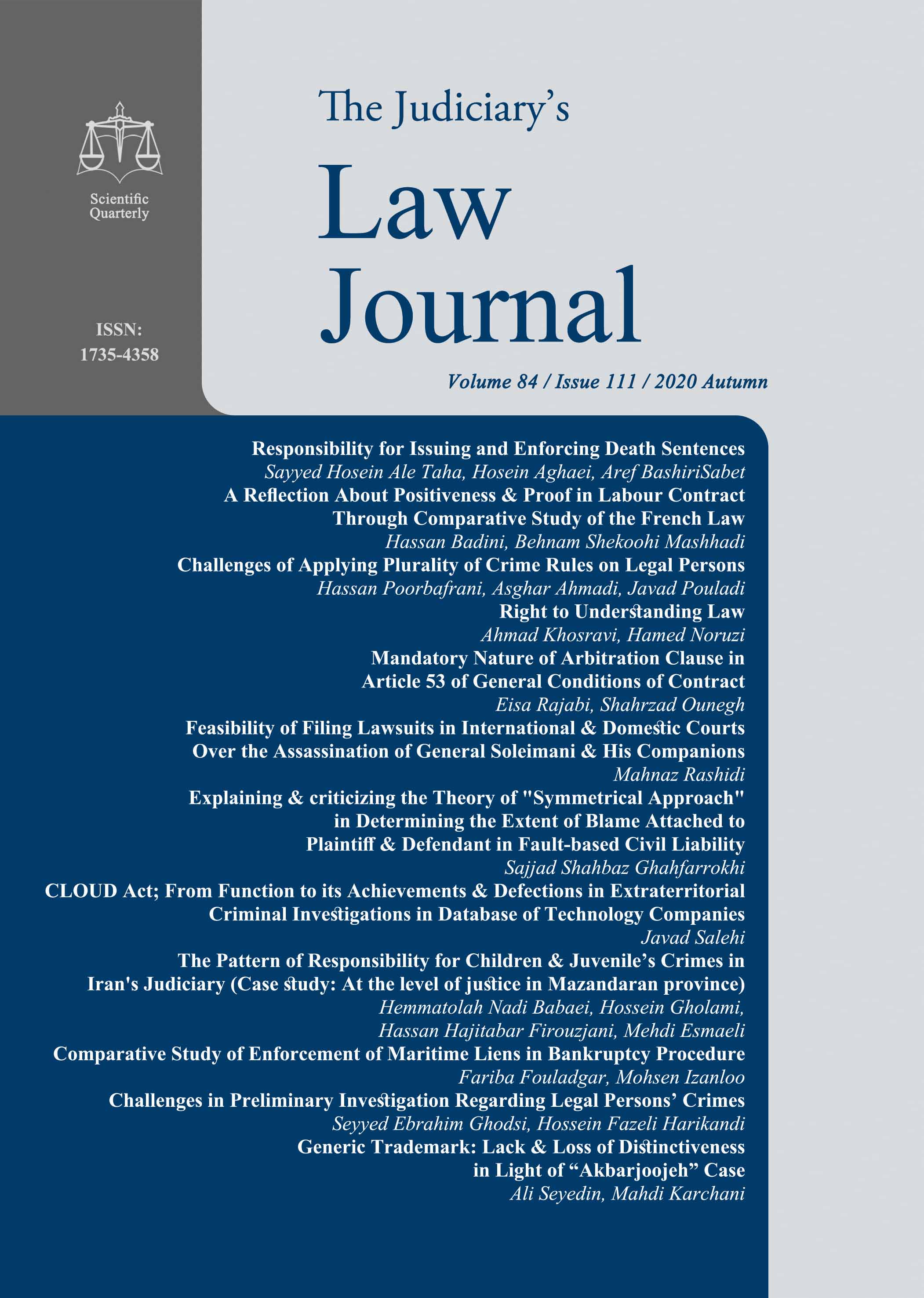Document Type : Research/Original/Regular Article
Authors
1 Associate Professor, Department of Law, Faculty of Administrative Sciences and Economics, University of Isfahan, Isfahan, Iran
2 Master of Criminal Law and Criminology, Faculty of Administrative Sciences and Economics, University of Isfahan, Isfahan, Iran
Abstract
Regarding to acceptance of criminal responsibility of legal Persons and punishment determination for these Persons in Islamic Penal Code (IPC) approved in 2013. This question arises how to execute plurality of crime rules towards guilty legal persons similar to real persons. Answering to this question, on hand is simple and on the other hand is difficult. It is simple since criminal responsibility of legal persons in Iranian Criminal Law has been accepted and also the real persons do not have distinctive character to allocate the concurrence rule for them. It is difficult since acceptance of criminal responsibility in Iranian Criminal Law is still young and transition from humanist look of Islamic Criminal Law to the persons, brings many challenges in the way of applying plurality of crime rules to the legal persons. On of the most important Challenges provided at article 20 of the criminal code is integration and extraneous nature of the legal persons punishment. These challenges put an stable obstacle in the way of execution of constructive plurality of crime rules. In addition to mentioned above, in accordance with article 134 of the criminal code related to the legal persons, execution of real plurality of crime rules has been met challenges such as not determination of aggravated punishment and then severity punishment and prosecutor’s authority in determination of tow punishment for legal persons. Above challenges would be made impossible execution of real plurality of crime rules on legal persons similar to real persons.
Keywords
Main Subjects
- پوربافرانی، حسن (1397)، حقوق جزای عمومی (مجرم و مسئولیت کیفری)، چاپ اول، تهران: نشر جنگل.
- پیمانی، ضیاءالدین (1374)، بررسی تاریخی و تطبیقی قاعده تعدد جرم، قم: مجتمع آموزش عالی قم.
- جعفری، مجتبی (1392)، «تعدد جرم و آثار آن در قانون جدید مجازات اسلامی (مصوب 1392)»، پژوهش حقوق کیفری، سال دوم، شماره پنجم.
- خدابخشی، عبدالله (1387)، «نقش قواعد مدنی در شناسایی مسئولیت کیفری شخص حقوقی»، فقه و حقوق، سال پنجم، شمارۀ 17.
- سیفی، مهدیه (1392)، مسئولیت کیفری اشخاص حقوقی در قانون مجازات اسلامی، پایاننامه برای دریافت درجه کارشناسی ارشد، گروه حقوقدانشگاه اصفهان.
- شریفی، محسن، محمدجعفر حبیبزاده، محمد عیسائی تفرشی و محمد فرجیها (1392)، «انتساب مسئولیت کیفری به اشخاص حقوقی در نظام کیفری ایران و انگلستان»، آموزههای حقوق کیفری، شمارۀ 6.
- شیخالاسلامی، عاطفه (1394)، «مشکلات ناشی از اعمال ماده 134 قانون مجازات اسلامی در بستر صلاحیتهای ذاتی محاکم»، فصلنامه تعالی حقوق، سال هفتم، شمارۀ 10.
- صانعی، پرویز (1372)، حقوق جزای عمومی، جلد دوم، چاپ پنجم، تهران: گنج دانش.
- فروغی، فضلالله و رضا رحیمیان (1394)، «ارزیابی تعدد مادی جرایم تعزیری در قانون مجازات اسلامی مصوب 1392»، مجله مطالعات حقوقی دانشگاه شیراز، دوره هفتم، شماره چهارم.
- قیاسی، جلالالدین (1388)، «بررسی وحدت یا تعدد جرم در حالت تعدد نتیجه»، فقه و حقوق، سال پنجم، شماره 20.
- کلانتری، کیومرث و سیدحسن جعفریان سوته (1390)، «افقهای اعمال کیفر در تعدد مادی جرم افعال مختلف عناوین متفاوت با تأکید بر حقوق ایران و مصر»، مجله تحقیقات حقوقی، شماره 56.
- محسنی، فرید (1389)، «تحولات مسئولیت کیفری شرکتها (از نظر تا عمل)»، دیدگاههای حقوقی و قضایی، شماره 52ـ51.
- موسویمجاب، سیددرید و علی رفیعزاده (1394)، «ضمانت اجراهای جرایم اشخاص حقوقی در قانون مجازات اسلامی مصوب 1392»، دیدگاههای حقوقی و قضایی، دوره 20، شماره 69.
- یوسفیان شورهدلی، بهنام (1390)، «مسئولیت اشخاص حقوقی در جرایم اقتصادی یا سازمان یافته: رویکردهای نوین ملی و بینالمللی»، مجله تحقیقات حقوقی، شماره 56.

